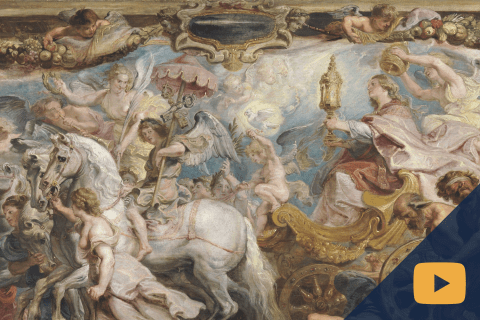
What is politics? We know it when we see it – parties, candidates, elections, not to mention rights, duties, and values. Usually it is about things that cause anxiety and hurt feelings, or things we don’t bring up over Thanksgiving dinner. Even the mere sound of political terms has a way of changing the gravity of any conversation, and giving it a tone similar to religion, love, or death.
Political conversation exposes distinct personality types. We find the expert in our midst who is full of vital statistics and historical facts, all intended to shape the discussion with useful information; we find the cynic who sees it as a display of elite foolishness, full of irony and comic relief; we find the harmony seeker who struggles to form a unanimous opinion and, failing that, to change the subject; we find the conspiracy theorist who has the deep information about “what’s really going on”; above all, we find the true partisan who views politics as a source of righteous fury, or an epic struggle where everything is at stake for even the most intimate aspects of life.
These responses, whether misinformed, silly, or delusional, whether conservative or progressive, still indicate an important quality in each person who engages in political conversation, perhaps their best quality: it is an urgent desire to get things right when it comes to our public life. Take those views away, and you rob them of an essential part of their personality, as political sociologist James Davidson Hunter observes: “These are, after all, discussions about what is fundamentally right and wrong about the world we live in – about what is ultimately good and what is finally intolerable in our communities.”1
There are big decisions to be made and sacred creeds to defend, and we all have a feeling of responsibility in deciding them, whether the few of us who will be lawmakers, or the many who simply vote. Being on the wrong side of a decision in terms of party affiliation or political philosophy can lead to real consequences for society, and that weighs on us. There is shame in not caring. (Have you ever seen someone wearing an “I Didn’t Vote” sticker on Election Day?) It reveals a vital truth: the object of politics is all about what is good, or at least what we believe to be good, for each human person, and the community that contains those persons.
Suppose we peel away all of the layers that shroud the question and ask like Socrates: What is politics in itself? Leaving aside politics as we know it today, what can we say about politics from across the centuries? Can we see what politics is by nature? And, once we see that, couldn’t it bring a great deal of help to our current public life and each of our own roles in it? At the very least, can we learn to see what is honorable in every view expressed in a political conversation, no matter how much we might disagree?
Based on the writings of Aristotle who brings that unique freshness of ancient Greek philosophy to bear on the question, I propose this: Politics is the art of living together in community.
If politics is an art, then it is not a science. There is a field of study called “political science,” to be sure, and it offers many valuable insights. But true politics is not an academic discipline. Nor can it be fully understood in terms of data or theories because it does not deal in facts or even values: politics is primarily about passions. It is made up of the lived experience, customs, and traditions of ordinary people (including political scientists) when they have strong passions about the good of their community and the flourishing of individual persons who compose it. We don’t necessarily think about politics when we do it: no one says, “let’s get together and do some politics”; instead we say, “let’s form a legislative assembly to solve our common problems.”
As an art, politics can be done in a way that ranges from poor to excellent. Like any art, though, it must be practiced to be done well. If we fall out of practice, our politics will be weak and unhealthy. Regular people will come to think of it in repulsive terms and avoid it, while those who pursue public life will view it as a matter of ideological struggle, a zero-sum game, not to mention a means of personal aggrandizement for politicians. Good people will come to regard it with disgust.
But if we do practice politics – if we strengthen our habits, know our history, cherish our traditions, and build up our institutions – it can become better and better. Like any art, with time, politics can even become excellent, or even beautiful.
So what does excellent politics look like? If politics is about passions – fear, greed, pity, euphoria, sorrow, hate – then excellent politics happens when these passions are well-ordered, and governed by reason. “[T]he intellect rules appetite with political and kingly rule,” Aristotle wrote; it is “according to nature” for the “passionate part of the soul [to be ruled] by intellect and the part having reason, while it is harmful to both if the relation is equal or reversed.”2 This is not to say that reason dominates the passions. Instead, it teaches and shapes them, so that emotional responses are rightly-ordered, showing a display of character that is self-controlled and self-governing, but also praiseworthy because they form virtues.
That is no easy task simply because the passions are powerful and reason is not. The passions shout, but reason whispers. There is one passion, though, that is different from the rest in its ability to listen to reason: anger, or what the Greeks called thymos, often translated as “spiritedness.”
However it is expressed, this spirited anger is essential for understanding politics because it reveals a constant desire for justice. Other passions are far more private, and they can only state what they are, or “How I feel”; but anger is far more concerned with “What ought to be,” particularly in human relationships. Anger is found in those who have been wronged, slighted, ignored, injured – and all expressions of anger show us an appeal to some standard of conduct that we expect of each other. We may deny this in theory, but in practice, we know it is true the minute we are the victims of theft, injury, or discrimination.
It should be no surprise that anger is the supremely political emotion, and it shows how integral politics is to being human. Beasts certainly show anger, but it is more a matter of rage than justice. Two dogs will fight, but in a few seconds, they are playing. Only humans hold grudges, meditate on the pain of mistreatment, or seek revenge. Only humans sue each other in court.
As reason rules over the passions using anger, so law rules over the people through politics.
Law is what forms the second half of our definition: living together in community. The first thing to consider is that politics is not a choice when there is a group of people. Whether a group of shipwreck survivors, frontier settlers, friends on a road trip, a church, a nation, or even a band of thieves – whenever we form groups, politics appears. It is what Aristotle meant when he said that we are “political by nature” and anyone who has no use for a political community is “either a beast or a god.”3
Humans are uniquely positioned between those two extremes: we have beastly passions mixed together with godlike (or angelic) intellect. It is in that special realm that politics takes on its unique meaning for us – or why politics explains exactly what we are as humans.
Law can be written down, but being written does not make it a true law. True law is more like what the Greeks knew as nomos – an organic, growing, developing custom or tradition of a people living in a certain place. It derives its true force and respect from the habits of a community. As Aristotle put it, “laws based on unwritten customs are more authoritative, and deal with more authoritative matters, than those based on written rules.”4 Even the United States Constitution, the most rational product of Enlightenment liberalism, “will not find it a superfluous advantage to have the prejudices of the community on its side,” James Madison wrote.5
In most regimes (monarchies, aristocracies, democracies, etc.) some people rule over others. But in the rare regime known as a republic – Aristotle’s polity, or the “thing of the people,” as the Romans knew it – law rules. Officials have great power in a republic, but only because the law gives it to them. Republics have no illusions about our tendencies to be self-interested and ambitious, not to mention delusional. This is because people can be overcome by their passions, especially when we are corrupted by power. But the laws of a republic take those passions seriously and anticipate them with institutions, checks and balances, and procedures. Above all, a republic of law assumes that the people have at least a sense of the need to be “both spirited and endowed with thought, and hence [it] remains free and governs itself in the best manner,” Aristotle wrote.6 In other words, a republic, because it is free, is the most political type of regime.
But suppose we wish to avoid politics completely and embrace a purely apolitical regime. Here, we should accept that all decisions are made for us by someone we didn’t elect, nor is their power limited in any way. Between euphoric patriotic feelings toward the leadership and sheer terror of brutal punishment, we are allowed to live a strictly private life of easy duties and small talk, free from the burdens of politics and self-government. Here, policy is the product of irrational whims more than any sense of the common good, by a mob of passions who cannot listen to reason. What subjects call “law” is not law at all, but assertions of power. This is, of course, a tyranny, the least political type of regime.
Politics for all its messiness is still the condition of freedom. To deny politics is to deny freedom.
Gaudium et Spes, a pastoral constitution of Vatican II, referred to the “difficult, but at the same time, the very noble art of politics.”7 The difficulty is clear: making reason govern the passions – the challenge avoiding the mob-like passions of hate and fear on one hand, as well as the passion of ambition and greed of public officials on the other. But then there is the other half – nobility of politics. This is not only to say that public life is honorable. Noble also means excellent or beautiful, a thing to find joy and satisfaction in. It is one thing to say that freedom ought to be our choice; it is quite another thing to say that freedom is in fact choice worthy. In a free regime, politics merits our love and care because it is a good thing, concerned fundamentally with human happiness.
Consider the things that make us human. We have the intellectual desire to extend our minds into all aspects of reality; we can make marvelous machines and techniques that can greatly minimize suffering; we have bodies that can heal themselves and fend off diseases, and perform athletic feats of grace and beauty; we have the ability to love, and grow from our love for each other; we get to participate in creation by having children. Each of these things is corrupted by sin in one way or another, yet none of them ever loses its true glory. So it is with our political communities. As an aspect of our liberal education, we should contemplate the fact that as political animals, like all other aspects of our nature, we are “fearfully and wonderfully made.”8
1 James Davidson Hunter, Culture Wars: The Struggle to Define America (New York: Basic Books, 1991), 31.
2 Aristotle, The Politics, translated by Carnes Lord (Chicago: Chicago University Press, 1984), 1254b5.
3 Ibid., 1253a1.
4 Ibid., 1287b5.
5 James Madison, Federalist #49, in Federalist Papers, edited by Charles Kesler (New York: Signet Classics, 2003), 312.
6 Aristotle, Politics, 1327b30.
7 Gaudium et Spes, 75.
8 Psalm 139:14.


